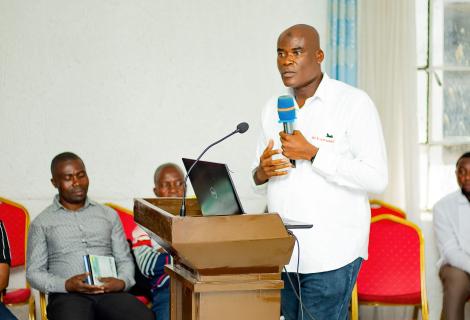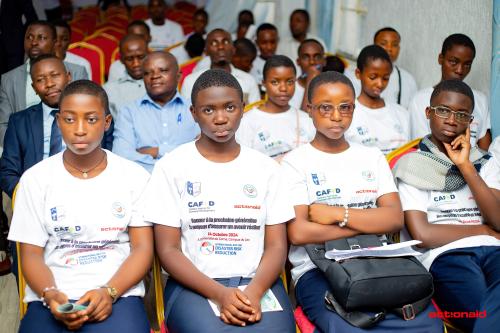Empowering the Next Generation to Build a Resilient Future

University of Goma Reflects on Disaster Risk Reduction with ActionAid
On the occasion of the International Day for Disaster Risk Reduction, the University of Goma, in collaboration with ActionAid DRC and CAFOD, hosted a day of reflection on the theme: “Giving the next generation the means to ensure a resilient future.” During the event, ActionAid DRC’s Country Director, Saani Yakubu, delivered an insightful presentation on the organization’s initiatives to combat the effects of climate change and foster resilience in vulnerable communities
On the occasion of the International Day for Disaster Risk Reduction, the University of Goma, in collaboration with ActionAid DRC and CAFOD, hosted a day of reflection on the theme: “Giving the next generation the means to ensure a resilient future.” During the event, ActionAid DRC’s Country Director, Saani Yakubu, delivered an insightful presentation on the organization’s initiatives to combat the effects of climate change and foster resilience in vulnerable communities.
ActionAid DRC: A Legacy of Resilience in Crisis
ActionAid DRC has been operational in the country since 1987, initially responding to the Burundian refugee crisis and the Nyiragongo volcano eruption. As part of the ActionAid Global Federation, the organization operates in multiple provinces, including South Kivu, Maniema, North Kivu, Ituri, Haut-Uele, Kasai Oriental, Kwilu, and Kinshasa. ActionAid uses humanitarian crises as opportunities to transform power relations, working towards gender equality and poverty eradication.
The Country Director emphasized that climate change and economic challenges continue to increase vulnerability in the DRC, making it harder for communities to recover from disasters. Extreme weather patterns, river floods, droughts, epidemics, and displacement are exacerbating the impact of these crises. The organization’s work on climate justice focuses on ensuring that the most vulnerable, particularly women, girls, and young people, have the tools to respond and rebuild their lives.
Climate Justice and the Fight for a Greener Future
In his presentation, Saani stressed that, for ActionAid, climate justice is about equity—wealthy countries must lead the charge in mitigating climate change while supporting developing nations in adapting to its impacts. The poorest communities bear the brunt of climate change, struggling to recover from failed harvests, destroyed homes, water scarcity, and health crises.
He stated that, in the DRC, 700,000 people were newly displaced in 2023 due to climate-related crises, contributing to the country’s total 6.3 million internally displaced persons (IDPs). Globally, an average of 26 million people are forced to flee their homes each year because of climate disasters, with 80% of displaced individuals being women.
With 70% of the world’s poor dependent on natural resources like land for their livelihoods, climate-related disasters—including droughts in Somaliland and flooding in Bangladesh and DRC, have worsened poverty, hunger, displacement, and unemployment.
Youth: The Agents of Change for Climate Action
One of the key messages highlighted in ActionAid’s presentation was the critical role of young people in driving climate action. Youth mobilization across the world reflects their determination to hold decision-makers accountable. Their message is powerful: the older generation has failed, and it is the youth who must bear the consequences.
However, young people are not just victims of climate change—they are also entrepreneurs, innovators, and change agents. They are leading the way through education, science, and technology, using their skills to scale up climate action and build sustainable futures.
Collaborating for a Resilient Future
ActionAid DRC continues to work with women, girls, young people, and communities to alleviate the effects of climate change. The organization provides sustainable farming solutions, campaigns for climate justice, and advocates for better policies to mitigate climate-driven poverty. Through events like this one at the University of Goma, ActionAid seeks to engage with local stakeholders to foster collaboration and empower communities to take charge of their futures.
The day of reflection serves as a reminder that climate change is not just an environmental issue—it is a humanitarian crisis that requires urgent action. It is through partnerships, advocacy, and the empowerment of future generations that we can build a resilient world for all.
